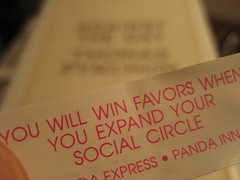Social Networking
How Can we fit popular sites like Myspace and Facebook into the teaching curricula, and culture of school? I think the idea here is of a digital self. Online there are many aspects that define who your are perceived. On myspace you are the drunk college kid, flicker you are the artistic photographer, and Monster.com you are the perfect employee who lives to work. There is a kind of balance in "real life" how much information you give people access to, and how much you tell someone at one time. I think this same concept applies to a persons online digital self.
In business, a common form of communication is the business card. It has some information, but not everything. You could research more with that info, but it would take time. The same can be applied to the digital identity of a person or business. A business can have a my space page, and use that as a medium to communicate about their goals, vision, and the such. Or it could be brief with lots of flash but little content, begging the viewer to find another aspect of that businesses digital existence. Just like in real life, these are decisions students and teachers should be aware of, but will have to apply differently to each circumstance.
As these new technologies and means of communication, there will come a standard of what information is commonly provided, and in what way, just like the company, title, cell and email address, printed on that specific sized business card (who in the world thought of that size business card anyway?)
Wednesday, March 14, 2007
Friday, March 09, 2007
Building an "Online" company
How do you build an "online" company? One where most of the workers call Starbucks, the office?
How do you have meetings?
What do you do if a laptop gets stolen?
Do you need face time?
I may or may not answer all of these questions. But they are interesting. Lets approach these backwards. From a brick and mortar company.
What would starbucks look like as an online company(more integrated into new tools, not digital cups of coffee). Their star partners(employees for those of you not up on the lingo) would blog about what it was like to work there. They would write comments about their favorite customers. It could be a door into deepining that 1 min a day conversation with those interesting artistic (or whatever) folks.
Maybe they would have a wiki for secret shopping excursions, and have people who know alot about coffee go in and do their snapshots (secret shoping) for the company, in exchange for a free cup of joe (you economists can ponder the principal agent problems of this, but it could work).
The key here is that it is user generated content, and categorization (more on the categorization in my tags post, and future folksonomies posts) of that content. It has the potential of a huge network of information, and a kind of grass roots marketing, while building the lifetime value of a customer by deepening the connections with those customers. It would also make recent new additions to the neighborhood (metephorical social "neighborhood", or whatever..... you know what I mean).
Internally there could be wikis for all kinds of stuff. Best practices of the coffee masters for how to make the best french press, repairmen sharing the latest problems and bootstrap solutions to fixing the latest brewer. By having the people "in the trenches" create and update the info, you always have current info. Sure there are problems, pr issues and whatnot, but that is where the corporate wiki could champion the good contributors, and discourage the bad ones (not sure what this all looks like yet, but who does?)
So none of those questions got answered, but I think going from what currently could work is a good start. How do you know what is on the other side of that mountain, unless you start writing erp, crm, charts and graphs of the best possible route..... I mean try and put two feet forward to climb that mountain?
How do you have meetings?
What do you do if a laptop gets stolen?
Do you need face time?
I may or may not answer all of these questions. But they are interesting. Lets approach these backwards. From a brick and mortar company.
What would starbucks look like as an online company(more integrated into new tools, not digital cups of coffee). Their star partners(employees for those of you not up on the lingo) would blog about what it was like to work there. They would write comments about their favorite customers. It could be a door into deepining that 1 min a day conversation with those interesting artistic (or whatever) folks.
Maybe they would have a wiki for secret shopping excursions, and have people who know alot about coffee go in and do their snapshots (secret shoping) for the company, in exchange for a free cup of joe (you economists can ponder the principal agent problems of this, but it could work).
The key here is that it is user generated content, and categorization (more on the categorization in my tags post, and future folksonomies posts) of that content. It has the potential of a huge network of information, and a kind of grass roots marketing, while building the lifetime value of a customer by deepening the connections with those customers. It would also make recent new additions to the neighborhood (metephorical social "neighborhood", or whatever..... you know what I mean).
Internally there could be wikis for all kinds of stuff. Best practices of the coffee masters for how to make the best french press, repairmen sharing the latest problems and bootstrap solutions to fixing the latest brewer. By having the people "in the trenches" create and update the info, you always have current info. Sure there are problems, pr issues and whatnot, but that is where the corporate wiki could champion the good contributors, and discourage the bad ones (not sure what this all looks like yet, but who does?)
So none of those questions got answered, but I think going from what currently could work is a good start. How do you know what is on the other side of that mountain, unless you start writing erp, crm, charts and graphs of the best possible route..... I mean try and put two feet forward to climb that mountain?
Friday, March 02, 2007
Interesting Wiki Info

I have thought about the time to adoption of wikis quite a bit recently (all those sleepless nights now have meaning). How long does a good idea take to be implemented by a large group of people? Or at least a sub group of people in say, one company?
There are many questions that pop into my head. How is the technology or tool modeled?(both by the upper management, and by direct reports of each level in the company) Is it (the tool, wiki, hammer, toy) really as user friendly as everybody says it is(ma by user friendly needs to ask the question, who is the intended user?). So these are good questions, but I found a website that is trying to answer some of these.
I frequent the blog Wikinomics, and they featured a site(If you have not guessed yet, it is the screen shot above).
The site is called Wikipatterns and it is exactly the kind of website I am finding useful these days. I am hoping it answers some of the questions about implementing a wiki, but even if it is not helpfull for me, at least it can serve as a sort of knowledge repository for me to refer people to(I love not having to reinvent the wheele, or wiki, or sliced something or other).
Subscribe to:
Posts (Atom)


